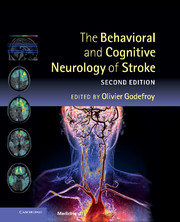Behaviour and cognition form a fascinating aspect of Stroke Medicine. This has been extensively covered in a 32 chapter book edited by Oliver Godefroy, with contributions from more than fifty physicians, well respected in the field. The book explains and clarifies the cognitive sequelae of strokes, so often underestimated in clinical practice where screening assessments may be relied upon because of the unavailability of specialist Neuropsychology.
The problems are often unmasked as the patient attempts to reintegrate into everyday life after discharge. The difficulties may be raised in outpatient consultations, where the opportunity for detailed assessment may be even more limited than on the wards. More subtle deficits may not be evident until a patient tries to return to work; their ultimate consequences may be far from subtle. Taking the perspective of planning care and organising services, cognitive and behavioural problems have a huge impact on rehabilitation: at the most obvious level, inability to recall information about exercises between sessions can easily impede progress to motor recovery.
The book is divided into three sections which cover: vascular cognitive impairment; the ‘analytic approach’; and, finally, dementia and management of vascular cognitive impairment. The largest is the middle section which contains 6 subsections and 26 chapters covering clinical syndromes such as alexia and agraphia, akinetic mutism and proposagnosia. Each chapter has key points to highlight the most relevant sections of text and plenty of illustrations/diagrams to help the reader follow. Each chapter is relatively short and easy to digest. Despite the number of authors, the text flows well from one to the next. Extensive referencing is provided.
This book as a whole is recommended for neurologists and non-neurologists dedicated to the field of Stroke Medicine and for generalists who encounter stroke patients in their clinical practice.
ACNR 2015;15(5):17. Online 13/11/2015
